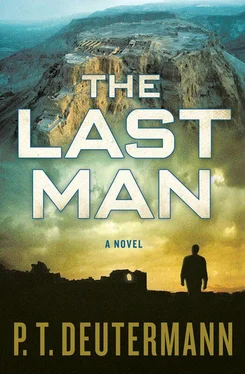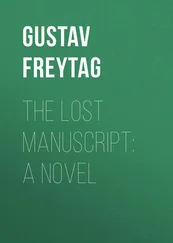“They did for water, depending upon how much remained in the rim cisterns. We think they took some of the stone works from down here to reinforce the outer casemate walls once the Romans began the siege ramp. As you can see, the foundations are all here, but there is a lot of material missing — and, of course, no wood fragments.”
“Right. The wood went into the walls at the end of the siege. This was a tough fight.”
“Yes, with very high stakes. If you have studied Roman military history, you know that once the Romans sank their teeth in, there was usually only one outcome.”
He gazed out over the western hills, shimmering in the early afternoon heat, and tried to imagine what it had been like up here for the Zealots. They would have watched with growing desperation as the inexorable Romans built first a wall around the entire mountain, the circumvallation, and then the ominous ramp, and finally the siege tower. The fighters among them must have known as they hunkered down on this impregnable rock, day after day, month after month, how it would have to end: an entire Roman legion fastened onto the flanks of the last Jewish stronghold, inching ever forward and upward. She seemed to sense his thoughts.
“When you actually stand here,” she said in a soft voice, “it is perhaps easier to appreciate why they did what they did. Two years and more, day after day, fighting off the daily probes, all the while watching the ramp grow. How many times must some of them have come down here to the lower palaces to look out at the Roman camp, watching and wondering: when? What they finally did may have come as a release of sorts.”
“Yes. Now you can understand why I wanted to come here. The books don’t convey that feeling. Adrian had been here, and she was fascinated with the place.”
“I forget. Was she a writer?”
“More of a dreamer, I think. Why?”
She smiled at him, a full smile this time. It illuminated her face. “Writers must above all have feelings,” she said. “For the atmosphere of places, for people’s emotions, a sense of tragedy if that’s appropriate. I am an antiquities historian more than anything else. We have feelings, too, but our passion is for cold facts and the truth more than for the people who made the history.” She paused for a moment. “This terrible place tends to confuse archaeologists, because the feelings intrude so forcefully.”
At that instant he was seized with the urge to tell her why he was really here. The intensity of this impulse surprised him, this sudden need to share with her, with someone, the enormous concept that had brought him here, but he knew he dared not do that. He would have only one chance, and that was probably going to be tonight or tomorrow night. One shot, yes or no, Adrian had been right or utterly wrong. He needed to keep his minder here well out of that picture until he knew. He looked at his watch. Almost three o’clock.
“Yes,” she said, looking at hers. “We must get back to the base. Do you want to walk back the way we came, or shall we take the cable car?”
“That’s a no-brainer,” he said.
She smiled again. “No-brainer? I haven’t heard that expression before, but I presume it means we ride, yes?”
* * *
After their meal together in the restaurant, they again bought some fruit, bread, and bottled water for later that evening. On the way into the hostel to stash their supplies, David suggested they take a walk down to the beaches of the Dead Sea. At first she seemed reluctant, but then agreed, and they met fifteen minutes later out in the parking lot. The sun was well down in the western sky, and the day’s heat had begun to break, the ovenlike air giving way to the first hint of an evening breeze. The east side of the mountain and the southern ravine were in deep shadow, with only the rim of the fortress reflecting a golden light off the ruined casemate walls. There were still some tourists up there, but for an instant David imagined he was seeing the long-lost defenders.
They threaded their way through the parking lot where half a dozen tour buses were loading up a gaggle of Japanese tourists, each of whom appeared to be carrying his body weight in camera gear. The bus engines were running at high idle to maintain air-conditioning inside, and the billowing exhaust gave the two of them an incentive to break into a light jog out of the parking lot, down the access road, across the coast road, and into the crystalline dunes.
David admired the determined way she walked along the hard-packed sand. He found himself walking slightly behind her, conscious of the poise and strength of her stride across the difficult ground, and the way those long legs moved. She had the body of an athlete, which made him curious: She didn’t seem to be the type who worked out, and yet she had managed the climb up the southern ravine at a pace almost equal to his, and he had been training for this trip for nearly a year. His thoughts were interrupted when she looked back over her shoulder and caught him looking.
“Tired already, Mr. Hall?” she asked with a teasing smile.
“I was just enjoying the view,” he replied, without thinking, and then colored. “I mean—”
“Yes, the light is interesting at this time of day, isn’t it?” She turned back around and kept walking.
He caught up with her, trying to cover his embarrassment, but she simply looked away across the water, as if suddenly fascinated by some distant object on the Jordanian shore. He kicked at a lump of solidified phosphate.
“This isn’t like any beach I’ve ever seen,” he said. “Certainly not like our ocean beaches.”
“You were one of those ‘surfer dudes’?” she asked.
He laughed. “No, not at all. I grew up in Washington, D.C. My father was a scientist at the National Bureau of Standards. We kept a summerhouse on the Delaware beaches. I was something of a natural water baby. My father was not thrilled.”
“He expected you to be a scientist as well?”
“Well, he didn’t expect me to grow my hair long and spend every waking hour down on the beaches with a bunch of surfer dudes, as you put it. I discovered scuba and girls when I was fourteen, and that didn’t help.”
“Scuba is an expensive sport for a fourteen-year-old, I should think,” she observed.
“So were girls,” he said. They had to walk carefully now, picking their way through a scrub of cactus and razor-sharp crystal stalagmites. “My Uncle Jack lives for outdoor sporting activities. He’s the one who actually taught me scuba. Do you dive?”
“My husband was the fanatic with the scuba,” she said. “At first I did the diving just to be with him. Then I became an enthusiast. It is popular here in Israel.”
“Yeah, well, in the summers I went to work in a dive shop to pay for all the pricey toys. I love to dive; I’m going to do Caesarea Maritima when I’m through here.”
“I would think a parent would be afraid, a fourteen-year-old doing scuba.”
“Part of a general pattern, I’m afraid. Teenaged boys in America often do precisely what most disturbs their fathers. I had a much better relationship with my uncle than with my father. Fortunately, I had a younger brother who was everything Dad wanted. Outstanding student. Career oriented from the age of about eight months. I think Dad kind of kissed me off once he figured out that Larry, that’s my younger brother, was going to turn out closer to the mold.”
“Yet still you became a nuclear engineer?”
“That was the funny part. My mother realized before I did that I had more brains than I was letting on, especially in math and science. She steered me into the right courses, the ones I could do in my sleep — math and science. That left me more time for other interests.”
Читать дальше












